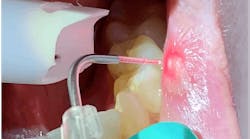What do you think of when I say continuing education and team training? Are you bored already? But the truth is that training and CE are essential for not only the success of the practice, but for your own growth as well.
Dentistry has changed a lot during the 42 years I’ve been practicing, and I found out a long time ago that we have to keep up with those changes. Sure, you may be in your bubble now, but what happens when you get removed from that bubble and asked to do something different? After I'd been in dentistry for 10 years, I thought I knew it all. I was working for a dentist, but I needed different hours for my family and I interviewed for positions.
I had so much confidence in my abilities that I sold my skills to a great new place to work. I got the new job and bam! I felt like I didn’t know a thing. Everything was different. The practice used different materials, wanted instruments passed a different way, and conducted patient conversations a differently. I felt as if I knew nothing about dentistry and I even worried about losing my job. I sold myself as being one of the best assistants on the planet, and there I was, stumbling around like an oaf. I remember calling my brother and asking how long I had to work someplace before I could collect unemployment—that’s how bad it was. But I ended up working there for more than nine years because I started to educate myself.
More career wisdom from Tija Hunter
The advantages of dental assistants being cross-trained
What is basement dentistry, and why is it dangerous?
Educating yourself about different things in dentistry is a smart thing to do. If your doctor offers to send you to a continuing education course, take it. If you find a course you’d like to attend, ask to take it. If you’re told no, make the investment and take the class anyway. All that education stays with you, and the more you know, the more valuable you are to yourself and the job market. There’s a wide variety of training courses; some are mandatory, while others are not but they still help you learn and grow.
Team trainings consist of mandatory topics such as OSHA, HIPAA, and CPR. Suggested team trainings, though they may be mandatory in some states, consist of emergency medical procedures, human resources, human trafficking/domestic violence, emergency evacuation procedures, infection control procedures, and radiology. Other topics might include communication, patient retention, insurance procedures, collections/accounts receivable, new materials/product evaluation, and new equipment procedures.
In-person or online CE?
Does your practice attend in-person CE? Sure, taking an online class in your PJs is great, but you don’t get the excitement of being among your peers while you learn new things. In-person is the perfect way to meet new people and exchange ideas. You can also take advantage of lunch and learns in your practice; they’re a great way to learn about new products and services that can expand your practice. Not every product or service you learn about will be a good fit in your practice, but how do you know if you don’t introduce yourself to new things?
Many states have expanded functions, radiology requirements, or infection control requirements for dental assistants. Others require continuing education credits for your permit or license. Be sure you keep up with those credits as it could cost you dearly if you don’t. If you’re a DANB (Dental Assistant National Board) certification holder, you must maintain CE credits to remain certified. Failure to do so will result in you losing your CDA (certified dental assistant). Don’t let that happen!
CDA is a distinction that I’m very proud to hold and I won't let go of it without a fight. If you aren’t familiar with DANB and the various certifications you can earn from the organization, visit their website at to learn more. You never know where life is going to take you, so keeping up your certifications will give you peace of mind that you’re prepared for just about anything. CE courses will give you the confidence and momentum you need to keep moving forward,
People can become complacent and lazy. We get in our routines and absorbed in our lives and may forget to take care of ourselves. It’s in our nature to take care of others before we take care of ourselves. I’m here to tell you that this is the worst thing you can do. The people who depend on you, need you. If you aren’t at your best, you can’t take care of others. Taking time for yourself to learn and grow is the very best thing you can do for your family, your practice, and yourself.







